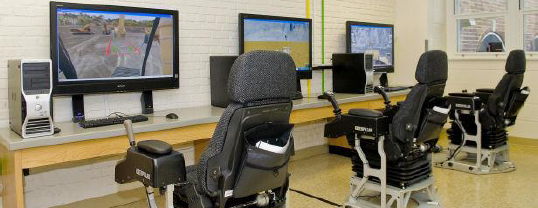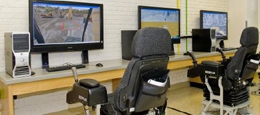Simulation Training
The other aspect of our training that we would like to highlight here and which is allowing us to conclude that Trinidad and Tobago labour force deficiencies can be eliminated within a stipulated time is by Simulations. A simulation is a training methodology that can expedite the learning process and will allow the labour force to grasp as much as real life situations and learn with computer based tools that gives an impression of a real jobsites. It has been seen as a marvel especially when it comes to skilled trades training.
For any trainee, especially the first timers it is recommended that they should attain a sense of confidence and an adaptability consent before they put themselves to actual machines and/or equipments. Simulators will help in breaking that ice which could be the curiosity or inquisitiveness that learners have related to the equipment before they get to see, touch and feel it.
Simulators are the best way to test a trainee for real life situations at job that could be a reality in future and helps the trainers to gauge their understanding of the equipment and knowledge. It is actually a virtual world will possibilities of realities. Simulation can be described as a preliminary stage of practical / on-equipment training.
As we mentioned that equipment is an integral component of this training hence simulators too have a substantial role to play. All situational handing practices and decision making practices are possible through this mode only. Though the practical side will create real life situations but simulators can actually take them to next level and will help the trainee to go through all possible situations that can help him or her in learning and grasping all the aspects of equipment from its head to toe.

The intensity of the skills in labour doesn’t pertain to only what they are supposed to know but it has now crossed over. The labour force is considered better and an advantage to an employee if they know something extra too. Safety being the limelight of such jobs and prone to risks always alarm employers to ensure that they have a skilled person on the job or equipment each and every time. Being a well trained operator covers that gap which a normal training cannot guarantee to an employer.
Please be advised that simulations or computerized practical trainings are also one of its own kinds in Trinidad and Tobago. No one has ever induced such a level of training delivery strategy in certification courses like the way we have planned and aimed. Simulations as said before create a difference in the overall learning process and help each one to understand the core and concept of such courses easily.
Simulator holds a major portion in the cost management of these programmes too, like equipment (but not as major as equipment does). Like equipments, simulators are needed for these trainings and they are essential to have them. The simulator is nothing but the technology in hand. The advancement in this section happens quick and fast. Therefore we aspired to have latest of the technology in hand as it will allow us buy time until a software/technology upgrade becomes necessary. Since this is something we can’t do away with hence we have to manage ourselves financially to have them on board. Looking the accounting principle we have adapted - all the simulations related cost are categorized under ‘capital’ cost or expenditure and they have been spread over 5 to 10 years of life span which is the ‘depreciation expense’ based on the useful life of the equipment. This has helped us to stress on the ‘operating’ cost of the training programme which confirms positive results.
We have conducted a thorough research on the benefits of simulators in training and below are some benefits that we have concluded:
• With the simulator, we can give everyone the same training opportunity, but still carefully prescreen for Operator Potential using our own simulator-based benchmarks.
• Help trainees better understand operating concepts by demonstrating them, instead of just explaining.
• Help trainees in difficulty to meet same training objectives by allocating them more simulator time for practice. In this way, you can be sure that everyone will be ready for subsequent training in the field.
• Make the training at the controls of your heavy equipment safer. By providing a virtual seat for the drill-and-practice needed to acquire the necessary muscle memory and gain self-
confidence. Please be advised that fewer mistakes in the field means less wear-and-tear on equipment, since the "accidents" now happen on the simulator.
• Thanks to the simulator-based preparation, trainees will reach their performance targets sooner at the controls of your heavy equipment. As a result, we can focus to "find" time to teach them more advanced techniques without increasing seat-time hours.
• With simulation students become familiar with the operator controls and learn key core skills in a simulated world first. Then when they graduate to the real work, they'll reach your proficiency targets sooner. (We can "tune" certain parameters to make our Personal Simulator behave more like your equipment.)
With improved skills, student will be more employable, with a better opportunity to gain higher incomes, which results in better life for themselves and others. It will allow them to grasp knowledge and skills on time and be able to ready to be on the job as and when required.



